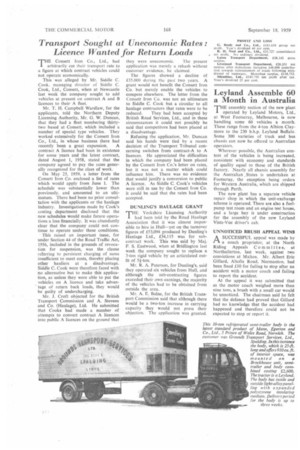Transport Sought at Uneconomic Rates : Licence Wanted for Return Loads
Page 52

If you've noticed an error in this article please click here to report it so we can fix it.
THE Consett Iron Co., Ltd., had arbitrarily cut their transport rate to a figure at which contract vehicles could not operate economically.
This was alleged by Mr. Siddle C. Cook, managing director of Siddle C. Cook, Ltd., Consett, when at Newcastle last week the company sought to add vehicles at present on contract A and B licences to their A fleet.
Mr. T. H. Campbell Wardlaw, for the applicants, told the Northern Deputy Licensing Authority, Mr. G. W. Duncan, that they had a fleet numbering thirtytwo based at Consett. which included a number of special type vehicles. They worked extensively for the Consett Iron Co., Ltd., in whose business there had recently been a great expansion. A contract A licence had been in existence for some years and the latest contract, dated August 1, 1958, stated that the company agreed to pay the rates generally recognized for the class of work.
On May 25, 1959, a letter from the Consett Iron Co. enclosed a list of rates which would apply from June I. The schedule was substantially tower than previously, and amounted to an ultimatum. There had been no prior consultation with the applicants or the haulage industry. Investigations made by Cook's costing department disclosed that the new schedules would make future operations a loss financially. It was abundantly clear that the company could not continue to operate under these conditions.
• This raised an important issue, for under Section 44 of the Road Traffic Act, 1956, included in the grounds of revocation for suspension, was the clause referring to persistent charging of sums insufficient to meet costs, thereby placing other hauliers at a disadvantage. Siddle C. Cook were therefore faced with no alternative but to make this application, as unless they were able to put the vehicles on A licence and take advantage of return back loads, they would be guilty of undercharging.
Mr. J. Croft objected for the British Transport Commission and A. Stevens and Co. (Haulage), Ltd. He submitted that Cooks had made a number of attempts to convert contract A licences into public A licences on the ground that they were uneconomic. The present application was merely a rehash without customer evidence, he claimed.
The figures showed a decline of £35.000 during the past two years. A grant would not benefit the Consett Iron Co. but merely enable the vehicles to compete elsewhere. The letter from the Consett Iron Co. was not an ultimatum to Siddle C. Cook but a circular to all haulage contractors that rates were to be reduced. They had been accepted by British Road Services, Ltd., and in these circumstances it could not possibly be said that competitors had been placed at a disadvantage.
Refusing the application, Mr. Duncan said his hands were tied by a recent decision of the Transport Tribunal concerning switches from contract-A to A licences. He appreciated the difficulties in which the company had been placed by the Consett Iron Co.'s letter on rates, but it was not a matter which could influence him. There was no evidence that would justify a conversion to public A licence, As Siddle C. Cook's vehicles were still in use by the Consett Iron Co. it could be said that the rates had been accepted.
DUNLING'S HAULAGE GRANT 'THE Yorkshire Licensing Authority
had been told by the Road Haulage Association that it was almost impossible to hire in Hull—yet on the turnover figures of £53,094 produced by Dunling's Haulage Ltd., £34,115 was for subcontract work. This was said by Maj. F. S. Eastwood, when at Bridlington last week the company sought to replace a 3-ton rigid vehicle by an articulated outfit of 5i-ton,
Mr. R, A. Paterson, for Dunling's, said they operated six vehicles from Hull, and although the sub-contracting figures exceeded their own earnings, the majority of the vehicles had to be obtained from outside the area.
Mr. A. E. Balne, for the British Transport Commission said that although there would be a two-ton increase in carrying capacity they would not press their objection. The application was granted.




































































































































